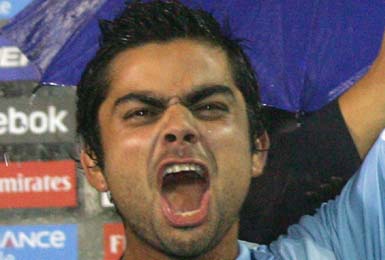 Mumbai, Sep 27: India's hottest young cricketer Virat Kohli is setting the world of brand endorsements alight. The Indian captain-in-the-making, whose exploits on the field, combined with his youth, good looks and never-say-die attitude, makes him a winner off the field too, has inked a Rs 10-crore per annum deal with German sports goods giant Adidas.
Mumbai, Sep 27: India's hottest young cricketer Virat Kohli is setting the world of brand endorsements alight. The Indian captain-in-the-making, whose exploits on the field, combined with his youth, good looks and never-say-die attitude, makes him a winner off the field too, has inked a Rs 10-crore per annum deal with German sports goods giant Adidas.
The three-year contract, perhaps the most lucrative to be signed by an Indian sports star, will see the swashbuckling right-hand batsman endorsing the brand's apparel and shoes.
The Delhi lad has also struck a Rs 6.5 crore a year deal with a tyre brand that had master batsmen Sachin Tendulkar and Steve Waugh as its ambassadors, a person familiar with the development revealed.
The two deals will see Kohli topping the likes of Indian skipper Mahendra Singh Dhoni and Tendulkar in terms of annual earnings per brand endorsement.
Kohli, who turns 25 later this year, pocketed around Rs 40 crore from endorsements last year, but that sum may swell up substantially with these two deals in his kit bag. Currently, he lends his face to as many as 13 brands, including Pepsi, Toyota and Cinthol deodorants.
When contacted by TOI, an Adidas spokesperson declined to comment on the development. Tendulkar, who is Adidas' current brand ambassador, is perhaps at the fag end of his illustrious career.
And Kohli fits the bill perfectly as he is being groomed to take over the top job from Dhoni after the 2015 ICC World Cup, an executive from a sports management firm, who did not want to be named, said.
Bunty Sajdeh-led Cornerstone Sport and Entertainment manages the Indian vice-captain's endorsement contracts. Sajdeh was unavailable for comment.
Kohli's annual endorsement fee has seen a meteoric rise over the past year, rivalling the likes of Bollywood heartthrob Ranbir Kapoor, the hottest brand ambassador in the film industry. Till last year, the cricket star used to command Rs 3 crore per brand annually, which went up to Rs 6 crore.
The Rs 10-crore a year deal with Adidas propels him to a different league altogether. "For the past few years, Dhoni has been ruling the endorsement space, but Kohli is catching up very fast. While Dhoni connected well with the masses, Kohli has a more urban appeal which a lot of brands want to cash in on," said Indranil Das Blah, COO of celebrity management firm CAA Kwan.
The price escalation in Kohli's endorsement contracts has meant that a lot of brands which had signed him early on must shell out much more to renew their deals or simply end their association with him.
"We are willing to pay a premium, depending on what that number is. He has been a great fit for our brand which targets youngsters, and he has grown with us," said J Suresh, MD and CEO, Arvind Lifestyle and Brands which has had the cricketer on board for three years as Flying Machine's brand ambassador.
The jeans-wear brand signed Kohli before the World Cup at a moderate price and its contract is up for renewal. With Rs 10 crore becoming the new benchmark, many brands will find it hard to match up to Brand Kohli's price tag.
Until recently, Kohli and Nike were in a five-year contract inked in 2008. However, things turned sour between the two sides when the US sports goods major went to court claiming Kohli had breached the contract by disagreeing to continue as its brand ambassador till 2014. But the Karnataka high court ruled in favour of the cricketer, allowing him to sign endorsement deals with other sports brands.





Comments
Add new comment